The Pursuit of Consistency: How Jalen Brunson Has Emerged into a Prominent Force for the Dallas Mavericks
It’s the night before the Dallas Mavericks play the Brooklyn Nets, and Jalen Brunson is sitting in a dimly lit room in an office building in Manhattan. It’s mid-March, and the 6-1 guard is having the best season of his career, averaging career highs in every major statistical category. Yet, when asked about the new level he reached this season, he makes it clear that he doesn’t think about any of that. He’s too busy thinking about what’s ahead, already too focused on the next goal.
“I don’t think about [how] I’m averaging career-highs. I know people always say it, like, How’s it feel? I’m just trying to be me, I’m not trying to blow anything out of proportion. Obviously, what I’m doing is good stuff, but the best thing about it is I know I could be doing better. That’s the part that keeps me hungry.”
What exactly does better look like for the Mavericks’ second-leading scorer?
“I’ll know when I get there,” he says confidently.
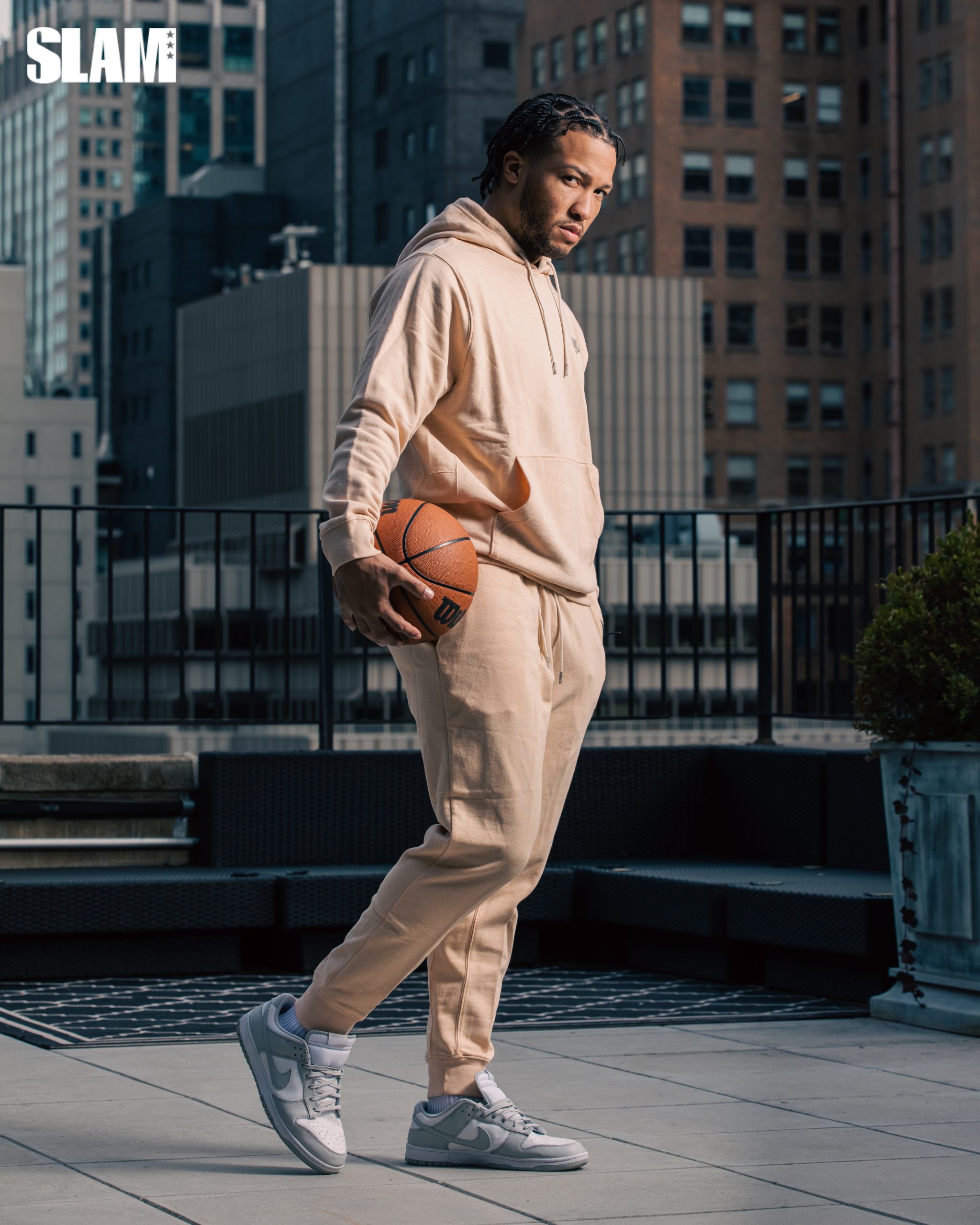
Until then, it’s all about staying prepared. There’s nothing flashy about the grind, nor is there about Jalen. At his SLAM photo shoot, he prefers to keep it simple and rock a few Nike sweatsuits. In between takes, he chops it up about how he’s a big movie guy and dishes a few takes on The Batman and Euphoria. When another question comes up about where his confidence comes from, there’s no ego or anything extra to his answer. “My work ethic,” he says. Simple as that.
His father Rick pushed and demanded it out of him. Jalen watched his father constantly work during his own 12-year long pro career, night in and night out. He trained relentlessly, too—in the summer, Jalen says Rick would run in the blazing heat wearing a sweat jacket, and at 7 years old, he’d be there, riding his bike alongside him. “I didn’t really understand it, I thought it was just what he did,” he says. “Seeing what people do now in their free time, versus what my dad did, I’m like, Damn. He did all that and he was in the League for nine years, overseas, CBA and never had a guaranteed contract.”
“I’m fortunate to be guaranteed four years, and I’m like, Wow. If I could work half as hard…I have to do something to get better, every day.”
He’s become methodical and committed to his routine, which has pretty much stayed the same over the years, whether he’s starting every game or playing less minutes: shooting the night before games, getting in his conditioning, eating at certain times of the day, taking a nap (if time permits) and entirely dialing in on the task ahead.
Brunson has always been that way, routine-oriented. He grew up watching how Rick would get ready for games, and at 2 years old, would mimic what he saw. According to his mother Sandra there’d be a “full-court” set up in his grandparent’s kitchen and living room with New York Knicks stickers taped onto their hardwood floors [Rick played for the Knicks for a couple of years at that time—Ed.]. A young Jalen would pack all his gear—sneakers, shorts and a jersey—into a duffel bag, put on a blazer or vest and say, Mom, I’m going to my game.
He would then walk through the house, put on his sneakers and do exactly what he does now as a four-year guard in the League—go to work with the ball in his hands. He’d copy the moves he saw the players around him do, including Rick’s then-New York Knicks teammate Allen Houston.
“I just like knowing what I’m getting myself into. I’m one of those guys that if you find a good restaurant, I could eat at that restaurant every time we go out,” Brunson says of being routine-oriented. “I think that gets your mind right. Once you’re in that zone of doing what you got to do to be ready for the game, it kind of takes the thought process out of worrying about other things. I don’t run any errands on game day. Sometimes I’ll stop and get a tea on the way to games, but I’m not trying to do anything to make me not think about being ready for the game. If I’m in that routine, I’m not thinking about anything. My mind is just, like, free.”
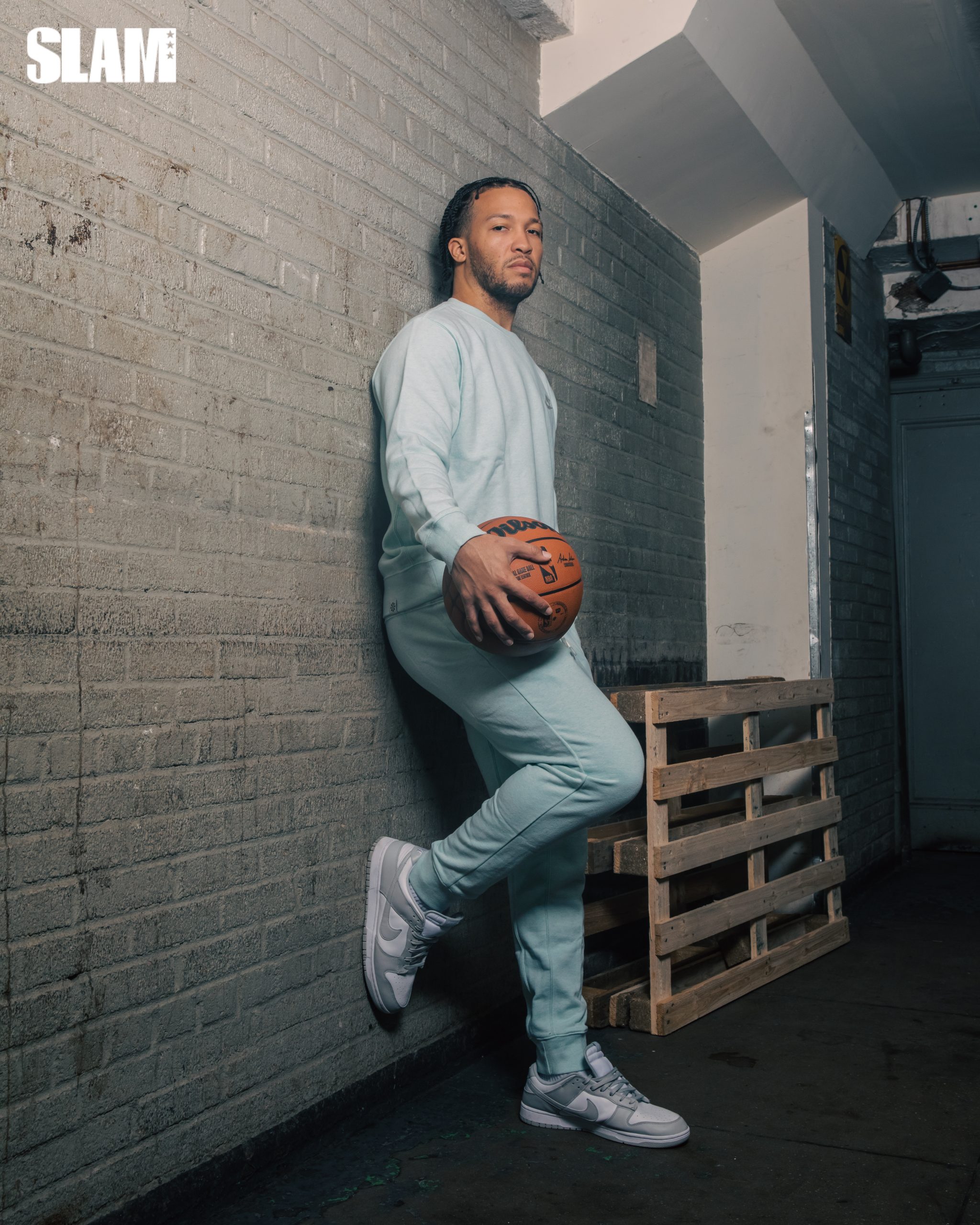
It was Sandra who taught him the art of goal-setting. While Rick was working in Charlotte as an assistant coach with the Bobcats, the rest of the family lived in Illinois. Sandra wanted Jalen and his sister to have a way to focus on themselves and their own goals, rather than on why their father wasn’t there or how long he’d be gone. It all started organically—school would begin in August, and Sandra would ask, What are your goals this year? What do you want to do? Jalen started getting creative with it, and would draft them up on the computer and hang them around his room. “I told him, It’s great to have goals and dreams but let’s stick with realistic goals. What are the things you can really achieve, right now? Let’s not think about down the road, like, Oh, I want to be in the NBA. That’s great. But let’s think about 10th grade. What do you want to do?”
That year, Brunson led Stevenson HS to a state championship against Simeon Career Academy, who was stacked with standouts like Jabari Parker and Kendrick Nunn. By his junior year, the five-star recruit was averaging 26.1 points and was named Illinois Gatorade Player of the Year. When Villanova head coach Jay Wright came over for a home visit, Sandra recalls him noticing the pieces of paper taped onto the walls in his bedroom.
Fast forward to Brunson’s junior year at Villanova, when he wrote down all of his academic and athletic goals and typed them up on the computer. He added on-court images of himself in the backdrop and then placed his goals as overlay text in an all-caps, bold white font. He hung the two pieces of paper on his dorm room’s white wall—on the left side were his academic goals, from graduating in the summer of 2018 to making the All-American, Big East and Big Five Academic teams, and on the right were his athletic goals. Those were very specific and performance-based: 2018 First-Team All American, All-Big East, All-Big Five. There were also some team-oriented ones—conference regular season and tournament champions, and winning an NCAA National Championship.
He’d then send Sandra the picture of those goals hanging on the wall to prove to her that he actually did them. Sandra still has the picture on her phone, which she shared with SLAM via text mid-interview.
“It was a thing, and it stuck,” she says of the goal setting. “I don’t really put too much pressure on him now. I still say, What are your goals? And I’ll text him, [but] I don’t see [them written down] in his apartment. Maybe it’s in his locker, or maybe it’s more internal.”
“That’s how I measure myself. I see these goals, and [how] I’m going to get there,” Brunson explains. “They’re mostly short term, for that year, I have long term goals of course, but that’s how I measure myself.”
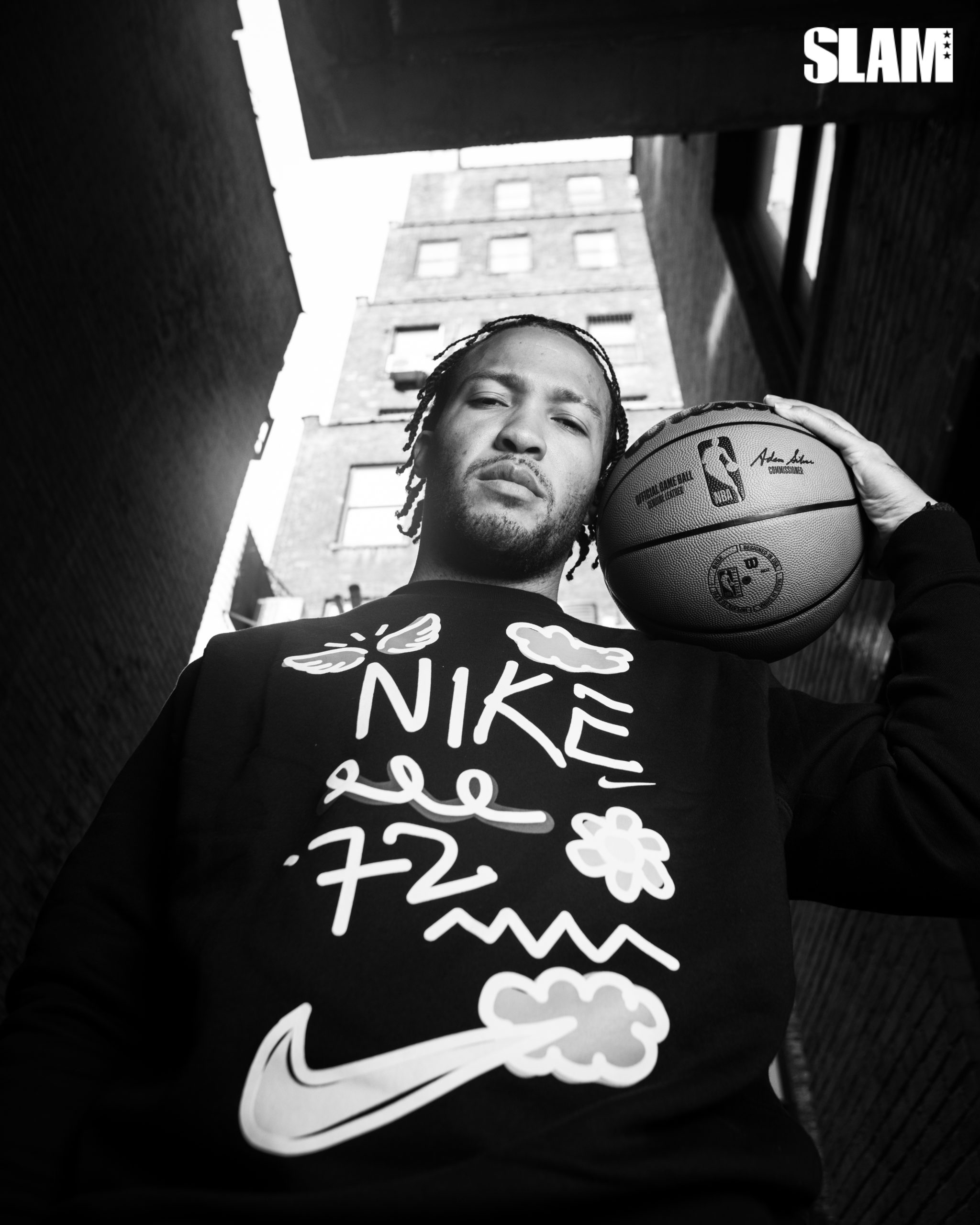
Preparedness, consistency and staying true to himself and the work have become the foundational fabrics to his approach. It’s how he solidified himself as one of the best guards ever to suit up for the Wildcats, but even then, Brunson wanted more. “I was a version of myself, I guess I technically didn’t know I had. I always knew I was good, playing the post, but we really used it as a weapon,” he says in retrospect. “I would say that where I was then was a perfect place, because I knew that I had accomplished a lot, I did a lot [and] was successful, but I knew I had so much more room to grow.”
When he came into the L as a rookie, Brunson found himself having to work his way up. He averaged just 9.3 points in 21.8 minutes of action. “That’s something that I’ve done at every stage in my career, high school, college and the pros. I have no problem with it, and honestly it makes me better. It makes me hungry, not really complacent. I’m always trying to find ways to improve myself. I just knew that whenever I got my opportunity, I was gonna make the most of it.”
Now in his fourth year, Brunson’s pursuit of consistency put him in a prominent spot in the team’s starting lineup, having started in 61 regular season games, averaging 16.3 points. When the team has needed him the most, Brunson has more than delivered. During a 10-game stretch in December, when many of his teammates, including Luka Doncic, were out due to injuries and COVID protocols, he steadily put up double-digit figures and averaged 21 points while shooting 51.3 percent from the field.
“That’s when it really clicked. I had some good games in the beginning of the year, but I think that stretch kind of solidified how people view me a little bit. My coaches know, my teammates know, and that’s all I really care about, [but] I guess people started to see and take notice. Thank you for noticing, but I’m doing this for myself, my team.”
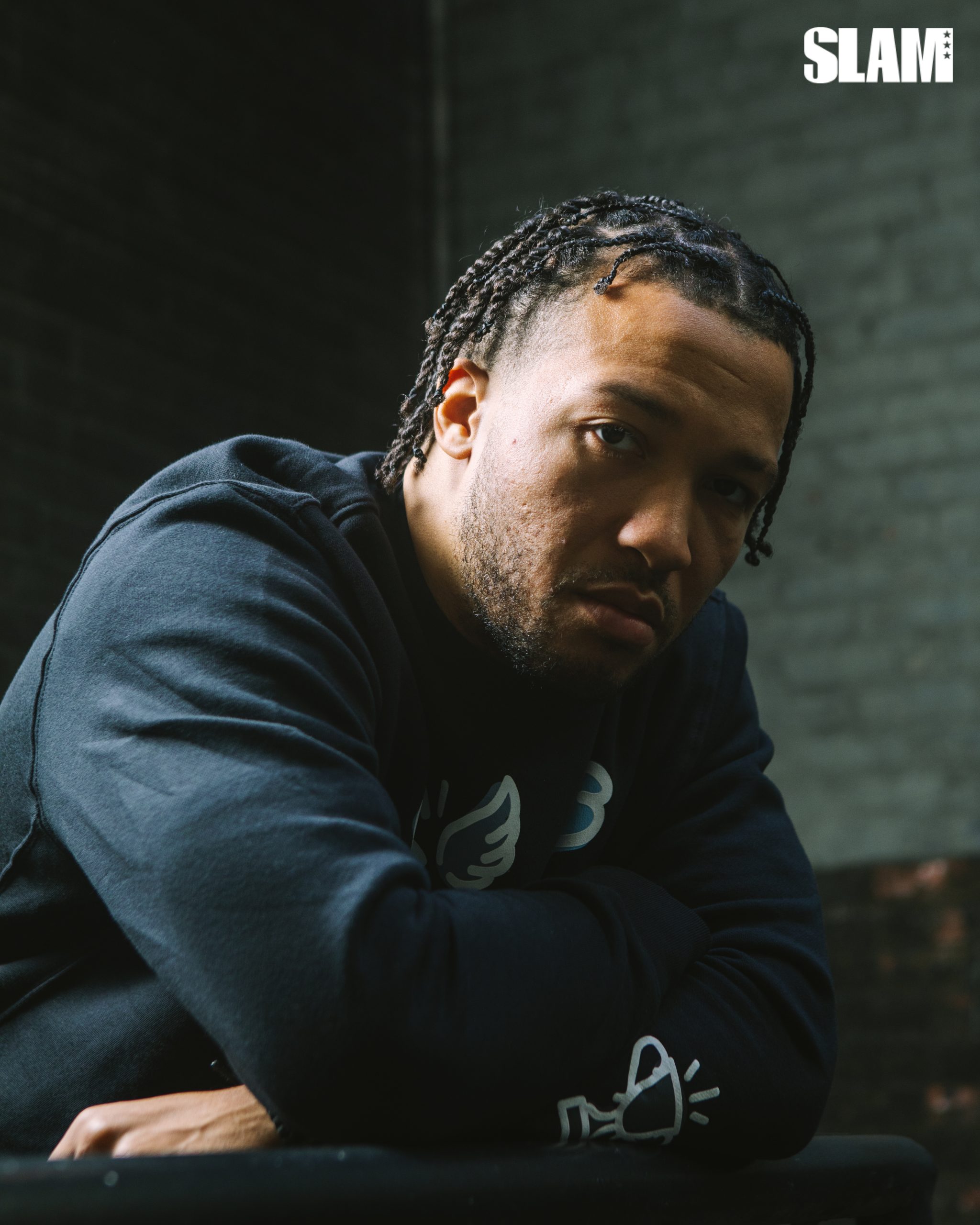
His words echo yet another lesson instilled in him by his parents. It was Rick who suggested to Sandra one day that she print out what people were saying, or inspirational quotes, onto sticky notes. Sandra placed them all around the house—in the bathroom, on the fridge, the television and mirrors. Seeing is believing, and when every corner in your place has a note reminding you of who you are, eventually, it becomes ingrained.
Rather than ride the wave of a good game, or in his case, the best season of his career so far, Brunson says that for him, it’s the standard. “Sometimes after games, yeah, I’ll watch [them] over and stuff like that, but [the feeling] is short term because I feel the same way when I don’t play well. I can’t be riding a hot streak of playing well, [or] when a bad day comes, I gotta switch it up. Whether it’s good or bad, gotta move forward.
“Just staying consistent with work, and obviously a little more opportunity helps, [but] I think being able to have [Jason] Kidd as a coach has really helped me understand things that I thought I already knew. Hearing it from someone else definitely could help me. He’s pushed me, he expects the best out of me every time. I do appreciate that, because it just doesn’t keep me satisfied. That’s how my dad was, just always wanting more, more, more.”
When Brunson dished a pass to Dorian Finney-Smith in the corner for the game-winning shot against the Kings in March, it was Kidd who came in with the constructive criticism while everyone else praised him. “He was like, ‘Oh, you should have went a little later. We wanted the last, last shot. Great pass though. Everyone else was like, Oh, he kind of just stole your show, and in my mind I’m like, Yeah, but like, when I think about it, that’s what I want. I want them to be coached like that. If people see me being coached like that, that gains a lot of respect from my teammates. I’m all about what the team needs, I’m all about respect. I’ll do anything to earn that respect.”
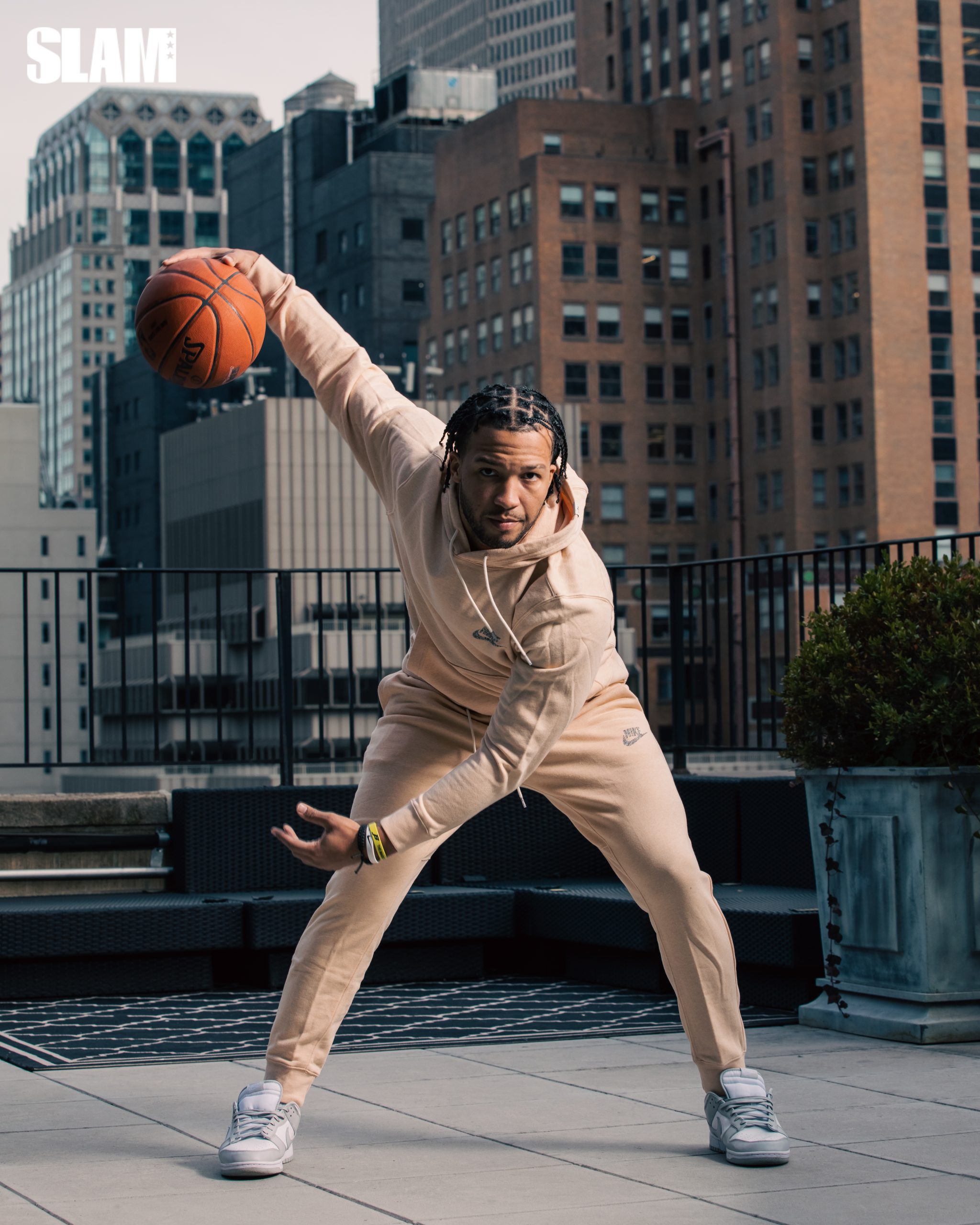
As the Mavericks get ready to face the Utah Jazz in Game 1 of the opening round of the playoffs, Brunson isn’t forgetting what happened last year. The loss still sits with him. “I haven’t moved past it. I still think about it, in a good way. I’ve always done well with a little bit of adversity.”
But he’s focusing on what he can control. His family’s saying, The magic is in the work, often runs through his head, and he even wears it on two bracelets.
“You’ve got to be consistent with what you’re putting out there on the court, but most importantly, keep your routine, keep having the same mentality [and] doing the things that you do that have gotten you here. Don’t just say, I’m here, now I can take a chill pill. Like, no. Keep pushing yourself. That’s how I want to continue.”
Portraits by Jonathan Lewis. Follow him on Instagram, @johnnyysilk.